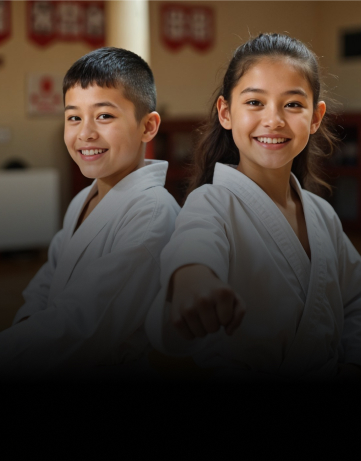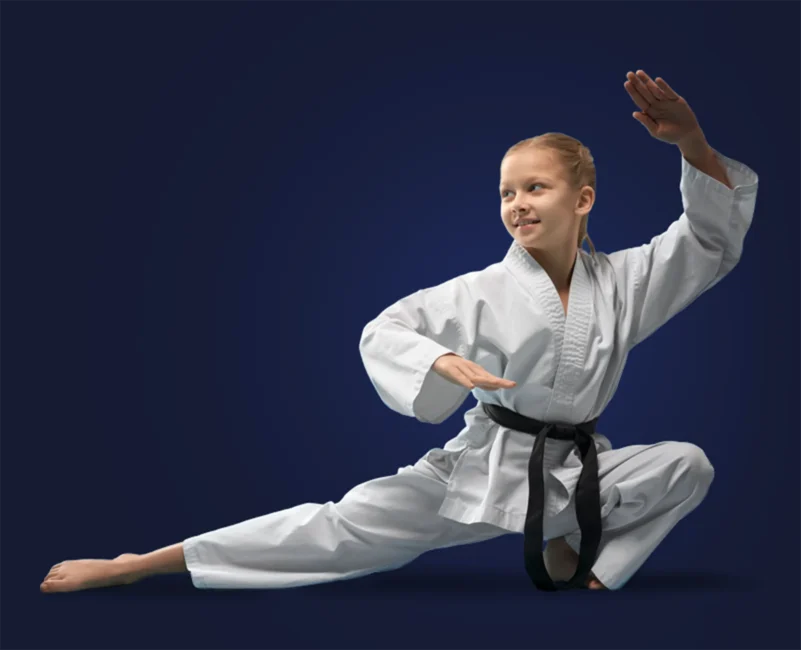Best Karate for kids – Highly Rated Programs Built Upon Respect and Resilience
Wiki Article
Just How Karate for Children Can Increase Self-confidence and Technique in Youthful Martial Artists
Karate for youngsters uses an unique opportunity to build confidence and self-control in young martial musicians. As they discover brand-new methods and face obstacles, they not only acquire skills however likewise create a strong feeling of self-respect. This structured environment motivates them to appreciate the journey of improvement. How does this training translate right into their daily lives? Discover the deeper links that make karate greater than just a sporting activity.The Significance of Confidence in Youth Development
Self-confidence is a crucial structure block in childhood development. When you support your youngster's self-worth, you encourage them to deal with difficulties, take risks, and reveal themselves easily. Youngsters with confidence are extra happy to discover new tasks and social scenarios, which can result in lasting relationships and useful experiences.Encouraging your child to step out of their comfort area cultivates strength. They learn that failing isn't the end but instead a tipping stone to success. By celebrating their success, despite how tiny, you help them identify their capabilities and worth.In this journey, assistance and positive reinforcement from you play a vital duty. Whether it's through appreciation or simply existing, your participation improves their confidence. As they expand, this self-assurance comes to be a long-lasting asset, outfitting them to navigate both obstacles and chances with a solid feeling of self.Exactly How Martial Arts Teaches Self-control and Focus
Martial arts helps you develop discipline and emphasis through its structured training routine. As you practice mindfulness throughout each session, you'll find out to concentrate far better both on and off the floor covering. Plus, setting and attaining goals in karate enhances your ability to remain committed and attentive.Structured Training Regimen
While you participate in karate training, you'll promptly discover exactly how an organized routine instills discipline and focus in young practitioners. Each class complies with a specific style, consisting of warm-ups, technique practice, and sparring. This uniformity educates you to commit and respect the procedure to renovation. As you learn techniques and forms, you create a feeling of responsibility for your very own progress.The organized environment urges you to set goals, whether understanding a new belt or improving a kata. You'll locate that staying focused during drills and classes develops your concentration. The technique you grow in martial arts prolongs beyond the dojo, positively impacting your schoolwork and daily regimens. Each session enhances the relevance of devotion, aiding you turn into an extra self-displined person.Mindfulness in Method
As you practice martial arts, you'll locate that mindfulness comes to be a vital part of your training. Each move needs your complete focus, aiding you remain concentrated on the here and now minute. You'll learn to ignore disturbances and focus on your breathing, movements, and intentions. This enhanced understanding hones your reflexes and enhances your discipline.During sparring or kinds, you'll discover the relevance of being emotionally existing - Karate Salisbury MD. You'll discover how this emphasis not just enhances your technique yet likewise builds your confidence. By exercising mindfulness in karate, you grow perseverance and durability, vital attributes that prolong beyond the dojo. In this means, martial arts teaches you to harness your mind, helping you establish a disciplined technique to difficulties both on and off the floor covering
Goal Setup Techniques
Establishing goals in karate isn't practically making belts; it's an effective way to cultivate self-control and emphasis. When you set details, achievable targets, you develop a roadmap for your development. For circumstances, as opposed to just aiming to enhance your kicks, attempt focusing on grasping a specific strategy each month. This approach keeps you inspired and engaged.Breaking down larger goals into smaller, workable steps assists you track your progression and commemorate tiny victories along the road. Whether it's improving your position or boosting your sparring endurance, every objective enhances your commitment. As you achieve these goals, you'll build confidence in your skills and develop a solid feeling of technique that prolongs past the dojo into daily life.Building Strength Through Martial Arts
Martial arts, particularly karate, uses children a special chance to develop durability in a helpful environment. In courses, they deal with challenges that push their limitations, whether it's mastering a new strategy or competing with a companion. Each problem, like a missed kick or a shed suit, ends up being a chance to learn and grow.As they practice, children learn to accept pain and maintain attempting, also when things get tough. They uncover that failure isn't the end; it becomes part of the journey. This attitude assists them bounce back stronger, not simply in the dojo, however in day-to-day life.With each difficulty they conquer, your youngster develops confidence in their capacity to deal with obstacles, sustaining their determination. Via karate, they'll recognize that durability isn't almost physical strength; it has to do with psychological grit and perseverance, empowering them to encounter whatever life throws their means.The Function of Regard in Karate Educating
Regard is a foundational concept in karate training, promoting a society of discipline and sociability among pupils. When you step onto the dojo floor, you're not simply learning strategies; you're also discovering to respect your trainers, peers, and the art itself (Karate Salisbury MD). Bowing at the start and end of class isn't simply a formality; it represents your recommendation of others' dedication.as and efforts you create mutual respect, you'll locate it enhances your understanding experience. You'll listen a lot more diligently to your teacher and gain insights from fellow trainees. This setting encourages useful objection and support, enabling every person to grow together.Moreover, respect grows self-discipline. Acknowledging the worth of effort and humility assists you remain concentrated on your training. In turn, this respect equates right into your day-to-day life, boosting your communications and connections outside the dojo. With martial arts, you find out that respect is essential for personal growth and community buildingSetting Goals and Accomplishing Success in Martial arts

Social Skills and Synergy in the Dojo
While training in the dojo, youngsters naturally develop important social skills and team effort capacities. As they practice along with peers, they discover to connect successfully, share space, and assistance one another. Each class offers opportunities for collaboration, whether it's throughout partner drills or team exercises. This synergy fosters relationships and produces a feeling of belonging, making the dojo a nurturing environment.Kids also gain important conflict resolution skills. When they come across difficulties, such as disagreements during sparring, they learn to browse these boban marjanovi? scenarios constructively. They exercise patience and compassion, understanding that everybody has various strengths and weaknesses.Moreover, joining team activities grows a sense of liability. You'll see your child learning to depend on colleagues and take responsibility for their function in a team. These experiences not only improve their fighting styles journey however additionally outfit them with social tools they'll lug into other locations of life.
The Long-Term Conveniences of Karate Beyond Childhood
As youngsters mature and change right into the adult years, the benefits of karate extend far beyond the dojo. You'll discover that the self-control and emphasis discovered via martial arts can convert right into your expert and scholastic life. Setting and accomplishing objectives in fighting styles promotes a solid job principles, which can push you to stand out in any type of endeavor.Moreover, the confidence obtained from competing and understanding techniques can boost your self-esteem, aiding you tackle difficulties head-on. This strength ends up being important as you star sports face the uncertainties of adulthood.Additionally, the social abilities developed through team effort and friendship in the dojo can bring about better connections in both personal and professional spheres. You'll learn to connect properly, willpower conflicts, and develop a helpful network.Ultimately, karate shapes not just knowledgeable martial artists, yet well-shaped people ready to take on the world.Regularly Asked Inquiries
What Age Is Ideal to Begin Karate for Children?
You can start karate as early as age four or 5, yet it usually relies on your youngster's maturation and rate of interest. Finding a course that fits their age and energy degree makes a huge difference.Exist Any Kind Of Health And Wellness Advantages From Practicing Martial Arts?
Yes, exercising karate offers many health advantages. You'll improve your adaptability, coordination, and toughness while boosting cardio fitness. And also, it boosts focus and psychological well-being, making it a great selection for overall physical and mental wellness.Just How Typically Should Children Go To Martial Arts Courses?
You should encourage your youngsters to attend karate courses at least 2 to 3 times a week. Uniformity helps them learn techniques successfully and create skills, making their experience much more satisfying and pleasurable in the future.Can Karate Aid With Managing Anxiety in Kid?
Yes, martial arts can help handle anxiousness in children. It instructs emphasis and self-control while offering a risk-free electrical outlet for energy. You'll see your child growing a lot more calm and positive as they practice consistently.What Equipment Is Required for Children Beginning Martial Arts?

Report this wiki page